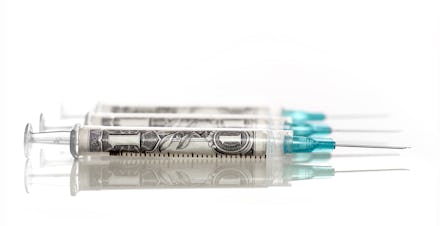The U.S. will get first dibs on the coronavirus vaccine, says French drugmaker

The United States’ gamble on Sanofi may yield a big payoff. Since it was the first to fund the French pharma behemoth’s vaccine research, it could receive Sanofi’s COVID-19 vaccine ahead of other countries, should the company bring one to market, Bloomberg reports. Other governments are also racing to fund such research, raising larger questions about COVID-19 vaccine access in countries that can’t afford to pay to play.
The U.S. would receive Sanofi's COVID-19 vaccine first because “they’ve invested to try and protect their population, to restart their economy,” Sanofi CEO Paul Hudson told Bloomberg, although he noted that this might just look like the country receiving it days or weeks before others do. He also said the U.S.’ investment entitled it to the largest pre-order.
The U.S.’ Biomedical Advanced Research and Development Authority (BARDA) has channeled $30 million to date to Sanofi’s vaccine research program, according to Bloomberg. Hudson praised the relationship as a model of government-industry collaboration.
Sanofi has partnered with fellow pharmaceutical giant GlaxoSmithKline Plc on the BARDA-funded COVID-19 vaccine project, per Bloomberg. Their candidate is based on past work on SARS and technology Sanofi uses in one of its existing flu vaccines. They’re scheduled to launch human trials in the second half of 2020, and have a vaccine ready to go in the second half of the following year.
Hudson told Bloomberg he’s been urging European governments to ramp up their investment in vaccine research, lest they fall behind in obtaining COVID-19 vaccines. Sanofi has reportedly been in talks with them about possibly supplying them with such vaccines, and has been regularly fielding phone calls, according to Hudson. He said some countries have even offered to divvy up the risk of investing in an experimental vaccine candidate.
But what about countries who can’t afford to pump funding into vaccine research?
Meanwhile, the U.K. will get dibs on a vaccine under development at the University of Oxford, AstraZeneca Plc CEO Pascal Soriot told Bloomberg. AstraZeneca will manufacture it.
“It’s important to have some of these discussions now” to safeguard against “vaccine nationalism,” Katherine Bliss, senior fellow in the global health policy center at the Center for Strategic and International Studies, told Bloomberg.
Indeed, BARDA’s apparent “America First” strategy to securing a COVID-19 vaccine also includes funneling of hundreds of millions of dollars to Johnson & Johnson and Moderna Inc. for COVID-19 vaccine development and production, per Bloomberg. The Trump administration’s Operation Warp Speed, similar to an existing National Institutes of Health program, also aims to accelerate the rollout of a COVID-19 vaccine.
But what about countries who can’t afford to pump funding into vaccine research? Without protective doses, they could see untold death counts, not to mention economic ruin amid prolonged lockdowns that prevent people from working, Bloomberg notes.
Krishna Kumar, a senior economist and director of international research at RAND Corp., told the outlet that the country that rolls out a COVID-19 vaccine first will probably partly own the distribution. BARDA, however, wouldn’t determine the number of doses of Sanofi’s vaccine the U.S. would get, or how much it would cost, and relies on the company to make it affordable, according to Hudson.
A number of vaccine research projects plan to bring vaccines to market in 2021, and in some cases, to offer limited availability to vulnerable groups, like frontline health workers, this fall, Bloomberg reports. Based on what we’re seeing with BARDA and Sanofi, we can probably expect drug companies, and countries with the means to fund their research, to largely influence who gets access to them.